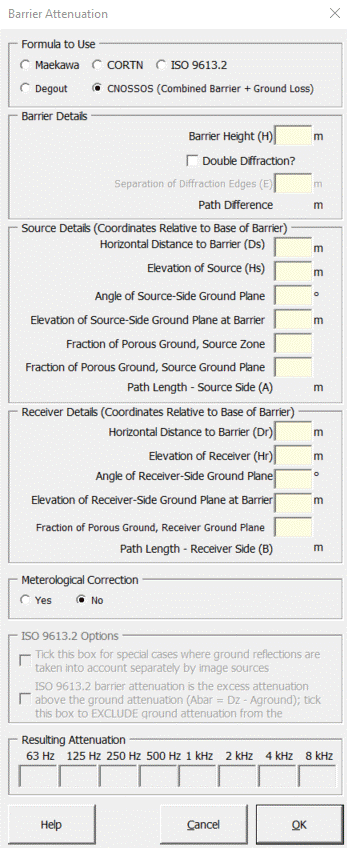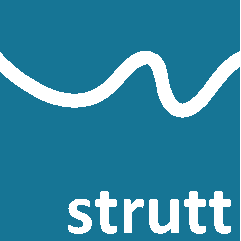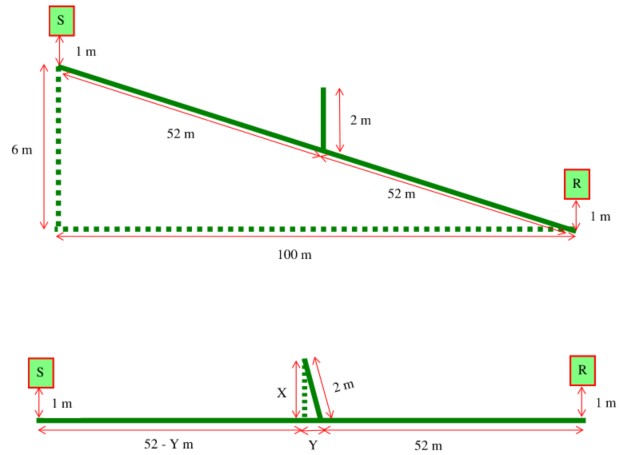

Strutt|Environmental Noise|Barrier Attenuation provides a barrier attenuation calculation, using either the Maekawa, ISO9613-2(1996), ISO9613-2(2024), Degout, CNOSSOS or CORTN method, which is entered in the active row of the worksheet.

The calculation is valid for the shadow or illuminated zone of the barrier and is limited to a maximum attenuation of (-) 25 dB at any frequency.
The CNOSSOS method of Barrier + Ground attenuation is also available and is discussed in detail here.
The Maekawa equation is implemented within the shadow zone as:
`IL = -[5 + 20log_10(sqrt(2 pi N_F)/tanh(sqrt(2 pi N_F)))]`
where,
`N_F = 2(delta/lambda)` is the Fresnel number
The CORTN method gives a single-number dB(A) value, which is placed in Column E of the active row. In the Barrier Attenuation user form, the attenuation is displayed in the octave band cells, but the final result is a broadband value only, and selecting the CORTN method will NOT insert spectral values into the active row. The CORTN method is implemented using the following equation:
`IL = A_0 + A_1 x + A_2 x^2 + A_3 x^3 + ... + A_n x^n`
where,
`x = log(delta)` and `delta` is the path difference, m
The coefficients `A_n` are:
A0 |
A1 |
A2 |
A3 |
A4 |
A5 |
A6 |
A7 |
| -15.4 | -8.26 | -2.787 | -0.831 | -0.198 | 0.1539 | 0.12248 | 0.02175 |
The ISO 9613-2 (1996) method includes an option to calculate the effect of meteorological conditions on the barrier attenuation, and is calculated as an insertion loss using:
`A_(b a r) = D_z - A_(g r) > 0`, over the top edge
`A_(b a r) = D_z > 0`, around a vertical edge
`D_(z) = -10log_10(3 + C_2/lambda C_3 delta K_(met))`
Where,
`A_(g r)` is the ground attenuation
`lambda` is the wavelength of sound at the frequency in question
`delta` is the path difference between the diffracted sound and direct sound, calculated using: `delta = d_(ss) + d_(sr) + e - d`
`e` is the distance between the two diffraction edges in the case of double diffraction
`C_2 = 20` and includes the effect of ground reflections; if in sepcial cases ground reflections are taken into account separately by image sources, `C_2=40`
`C_3 = [1+((5*lambda)/e)^2]/[1/3+((5*lambda)/e)^2]` for double diffraction; `C_3 = 1` for single diffraction
`K_(met)` is a meteorological correction factor calculated using:

The ISO 9613-2 (2024) method is an updated methodology, with changes from the 1996 methodology as follows:
`D_(z) = -10log_10(1+(2+(C_2/lambda)C_3deltaK_(met)))`, for `delta>z_(m i n)`; and `D_(z) = 0`, for `delta le z_(m i n)`
The Degout formula is calculated as follows:
`IL = {(0 " for " \ N_F < -0.25 ),(-6 + 12 sqrt(-N_F) \ " for " \ -0.25 <= N_F < 0 \ ),(-6 - 12 sqrt(N_F) \ " for " \ 0 <= N_F < 0.25 \ ),(-8 - 8 sqrt(N_F) \ " for " \ 0.25 <= N_F < 1.0 \ ),(-16 - 10log_10(N_F) \ " for " N_F > 1.0 \ ):}`